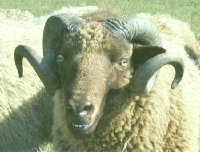
Shetland Sheep Home
Sheep Home
Shetland Sheep
- Shetland History
- Our Flock Goals
- Shetlands for Sale
- Shetland Wool
- Shetland Sheepskins
- References
and Links
Sheep Health Issues
Sheep Resources
| Why raise Shetland Sheep? They were Zack's idea in the beginning. I knew nothing about their wool or anything else, but I wanted to get started raising some type of sheep, so we went off to visit a couple farms. Didn't take long before I was as enthused as Zack about these small, colorful sheep, and in September 1998 we hurriedly fenced a small winter paddock, built a barn with the help of our local spinning guild, bought some hay, and were suddenly shepherds! |  |
| Terrible Timothy doesn't look so terrible! |
|---|
Shetland sheep are really ideal for small farms with little or no experience raising animals:
 Darling, two weeks before her twins were born in April 2001 |
|
| The question shouldn't be "Why raise Shetlands?" but "Why raise any other sheep?!?" |
|---|
| Site Map | Back to Top | Contact Us | Our Guarantee | Feedback |